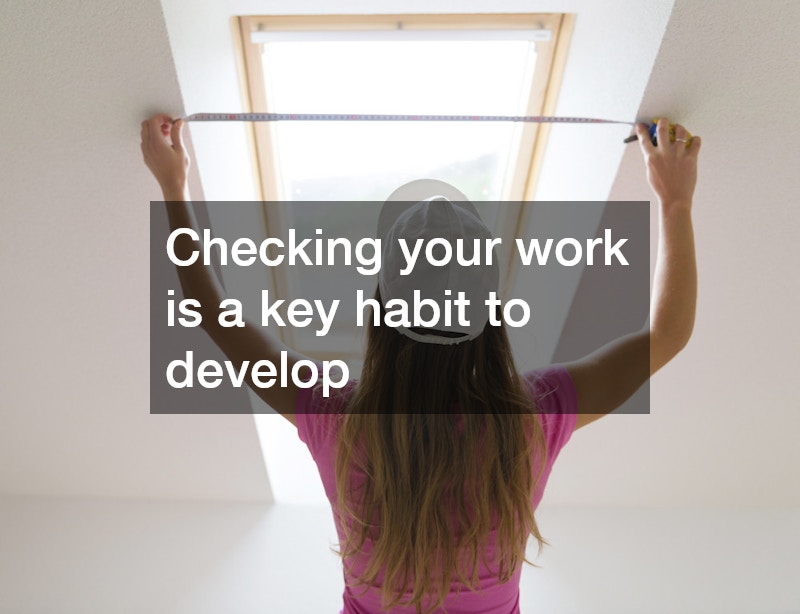It can be exciting to embark on a home improvement journey. You have your map (the plan for the project), your tools and materials, and your team (family members, friends, or contractors). Here’s how to avoid getting lost in the forest: develop the right habits that will lead you to success.
You’ll enjoy a more pleasant experience if you adopt these habits. Who knows? Who knows?
1. Planning and Research
You must do your research, just as Batman did before he jumped into Gotham’s Night. Research and planning are essential for any home improvement project. This is more than a good idea; it’s a roadmap to navigate a world of choices and potential pitfalls. Imagine choosing between marble and granite or which hardscape materials will complement the wild feel of your garden. You must also consider the durability, maintenance, and budget.
Here’s an expert tip: Don’t limit yourself to Pinterest boards or DIY blogs. Visit local home improvement shops, talk to professionals, and perhaps attend a workshop. You can avoid a lot of hassles by getting hands-on advice and experience.
Every decision you make will affect the timeline and quality of your project. You want to avoid having to redo that patio again next summer. Choose carefully your hardscape materials. You want to make sure that the kitchen renovation goes smoothly. Plan the layout carefully and choose materials.
2. Time Management
If you don’t have good time management skills, it can seem like your home renovations are stuck in an endless loop. Setting realistic deadlines is a good habit to develop. It’s easy to think that you can remodel the bathroom in a weekend. But let’s face it, unless you have a magical wand or fairy godmother, this will take more time.
Break the project down into smaller pieces and assign each a mini-deadline. But it’s not all about setting deadlines. Keep track of these pieces as a pro chess-player would. Prioritize your tasks according to their importance and sequence. You wouldn’t paint if the wall wasn’t up, would you?
Life happens. Unexpected delays can sometimes require changes to plans. That’s okay. You’re best to be flexible. You can adjust your schedule so that you do not paint at 2 am before your in-laws arrive.
3. Quality Control
Have you ever tried to cook a dish without tasting it? You could end up with a dish that would make your dog think twice. This is what happens when you don’t do quality control on a home renovation.

Checking your work is a key habit to develop. You don’t need to be a perfectionist, but you should keep an eye on things so that you won’t have to redo everything. You wouldn’t hire a roofer from the telephone book. You want a contractor who can tell shingles apart from shakes and spot problems before they become a water-filled mess in your living area.
Choices are important. From the type of nail you use to the paint you choose for your walls, everything must pass the “Is this the most I can do?” test. When your budget is tight, it’s easy to make a few cuts, but the quality ones will come back to haunt. It’s fun to make jokes that your cooking is the only thing that can bring down your kitchen, not the cabinets, because they were cheap.
4. Wearing Personal Protective Equipment
Personal protective equipment (PPE), as even expert DIYers like your trusted bathroom contractor will confirm, is not just for show. You should develop the habit of checking your work and using quality materials. You wouldn’t enter a hive of bees without any protection, would you? It’s the same for remodeling. These goggles don’t just look good, and they protect your eyes from flying debris. What about those gloves? These gloves are not only to keep your hands clean but also to protect them against cuts and scrapes which seem to appear out of nowhere.
Safety gear is not glamorous, but it beats a trip to the ER for an eye injury caused by a tile. It’s not only about the big things. Dust masks may seem excessive, especially if you are doing a quick task, such as replacing a tap. Your lungs will be grateful that you didn’t use them as dust filters. By investing in high-quality boots, you won’t have to walk on eggshells.
5. Seeking Help
You’ve probably found yourself in the middle of a project and realized you have taken on more than you can handle. It happens to everyone. It’s admirable to dive into DIY territory, but it’s not a sin to admit when you are in over your head. It’s important to seek help, a habit that you should develop alongside your power tool prowess.
Imagine you are tackling the installation of a fence, confident that you will finish it over the weekend. By Sunday evening, the fence is starting to look more like a piece of modern art than a solid boundary. You’ll have to swallow your pride at this point and call the professionals. The fence installation services are not just for people who have never used a hammer. They’re also a lifeline to DIYers who know that getting it done right can be better than doing it themselves.
6. Budgeting
Money talks, but mine only says goodbye. Keeping a tight budget for home improvements can be like herding kittens. Money is the deciding factor in any home improvement project, whether you are looking to do a quick touch-up on your front door or want to transform it with stylish entry door glass inserts. It’s not only smart, but essential to start with a budget. This is one of those habits you need to develop, similar to flossing but with a greater focus on saving yourself from financial problems in the future.
Imagine this: you fall in love with designer entry door inserts that promise to give your home a new look. Without a budget in place, your love affair with designer entry door glass inserts could turn into a financial disaster. Budgeting does not mean that you must sacrifice style.
The key is to decide where you want to spend and where you want to save. You may be unable to compromise on those expensive glass inserts. It’s cool, just put it in. Find savings elsewhere. You could DIY the installation. There may be a cheaper but equally beautiful option for flooring.
Let’s not overlook the unexpected. It’s not so unlikely that a squirrel will decide your attic is going to be the next hot real estate market. You get the idea. Even when the unexpected happens, a “just in case” fund will keep you on track. Budgeting does not mean restricting your freedom. It is the opposite. You can make your home improvement goals come true without the worry of a stretched budget.
7. The Right Tools
It’s not only about the shiny, big power tools that are awesome but also the unsung heroes in the toolbox who can make or ruin a project. It’s not just a smart thing to do, but it can save you headaches.
Imagine impressing landscape designers with your DIY abilities, only to discover that you were using garden shears to do something for which a pruning saw was needed. Oops. Not only is it embarrassing, but also a reminder to use the right tool for every job. Here’s an expert tip: measure twice to ensure you only need to cut once. This saves you time, money, and even your dignity.
It’s almost an art to know where to spend money on expensive tools and where you can get a good deal. It might be sexy to have a top-of-the-line drill, but will you really need it for hanging a few photos? Most likely not. A quality paintbrush will make the difference between an ‘expert’ finish and one that simply screams.
8. Checking Permits
It can be just as stressful to navigate the permits world before beginning a project at home. You can avoid the symbolic explosions of fines and rework by building a habit of checking for permits. Imagine that you dream of replacing your old carpet with chic hardwood flooring in your living area. You can’t just pick the wood and get started. There’s more to it than that.

Check to see if the city, town, or HOA has anything to say about remodeling. They may be cool with your remodel as long as the noise is kept down. Sometimes, they have a booklet full of things that you should do to earn their approval. This is a step you do not want to skip. It’s not fun to tear up your floor only to discover that you need a permit. Your living room is suddenly a no-go zone. You wish you had spent the afternoon in front of reruns.
9. Adapting to Changes
It can be difficult to adapt when your project suddenly takes a left turn. Imagine that you are ready to hire a deck contractor, picturing BBQ weekends and starlit soirées, but then discover local codes more complicated than your grandmother’s recipe for lasagna. This is where you need to put your habits into practice, such as becoming friends with patience and flexibility. You’re learning to dance when your heart is set on a sunny picnic.
It may be that you need to move the deck you imagined a few inches to meet a local bylaw, or the materials you were enamored with are not allowed in your region. You don’t just have to find a solution; you must also look for the positives. The new material may require less maintenance, or the location might offer better views. These shifts may test your zen, but remember that every problem has a solution if you are willing to search for it.
10. Communication Effectiveness
It’s like learning a language in a different country. You have to get your message across so you don’t accidentally order a coffee table when you mean a kitchen cupboard. Effective communication is one of the most important habits you can develop. Talking smarter is more important than just talking. Imagine you are knee-deep, choosing the perfect cabinet for your kitchen.
Don’t just agree with what the contractor has to say. Add your own two cents. Even if the questions seem ridiculous, ask them. There’s no dumb question, only stupid mistakes that you could have avoided with a bit of conversation.
Listening is also important. What’s not spoken can be more important than the unspoken lumber in your deck project. Don’t forget to be light-hearted. Humor can help keep the mood light, even if the topic is budget overruns and unexpected delays. Effective communication is more than just being heard.
Humor, adaptability and good communication are not just good ideas, they’re essential. These habits are the secret ingredient in any home renovation. They can transform a disaster into your dream home. Who knew that asking “dumb” questions could save you a lot of grief or that laughing at a mistake could make the difference between a meltdown and a story that will be remembered? Keep your cool when unexpected events occur. In home improvement, unexpected events are part of the deal.
